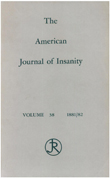Dopaminergic responsivity in alcoholism: trait, state, or residual marker?
Abstract
OBJECTIVE: In order to classify neuroendocrine abnormalities in alcohol- dependent patients as trait, state, or residual markers, growth hormone (GH) secretion was assessed longitudinally. METHOD: GH secretion, stimulated by the dopaminergic agonist apomorphine, was evaluated in 21 alcohol-dependent patients (16 men, five women) and 10 healthy comparison subjects (eight men, two women). The patients were tested during early withdrawal, after 8 days of abstinence, and after 3 months. RESULTS: Patients who relapsed within 3 months (N = 8) showed significantly less GH secretion in all neuroendocrine tests than did either the patients who abstained from ethanol consumption for 6 months (N = 13) or the healthy comparison subjects. The relapsers and abstainers did not differ significantly in any of their clinical or pathophysiological data, in the severity of their withdrawal symptoms, or in antecedent or concomitant illnesses associated with alcoholism. CONCLUSIONS: GH blunting appears to be a residual marker of clinical relevance in alcoholism.
Access content
To read the fulltext, please use one of the options below to sign in or purchase access.- Personal login
- Institutional Login
- Sign in via OpenAthens
- Register for access
-
Please login/register if you wish to pair your device and check access availability.
Not a subscriber?
PsychiatryOnline subscription options offer access to the DSM-5 library, books, journals, CME, and patient resources. This all-in-one virtual library provides psychiatrists and mental health professionals with key resources for diagnosis, treatment, research, and professional development.
Need more help? PsychiatryOnline Customer Service may be reached by emailing [email protected] or by calling 800-368-5777 (in the U.S.) or 703-907-7322 (outside the U.S.).



